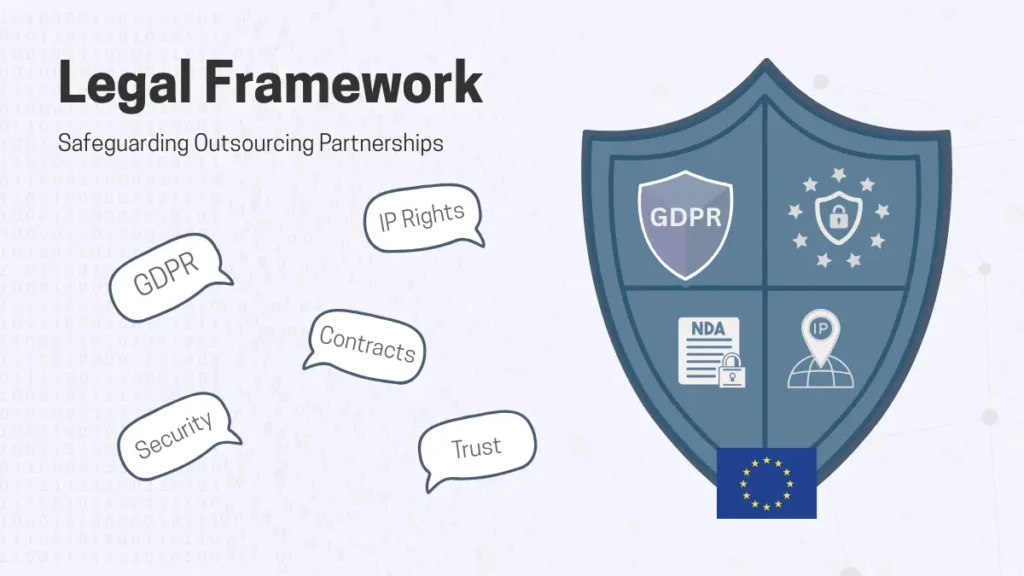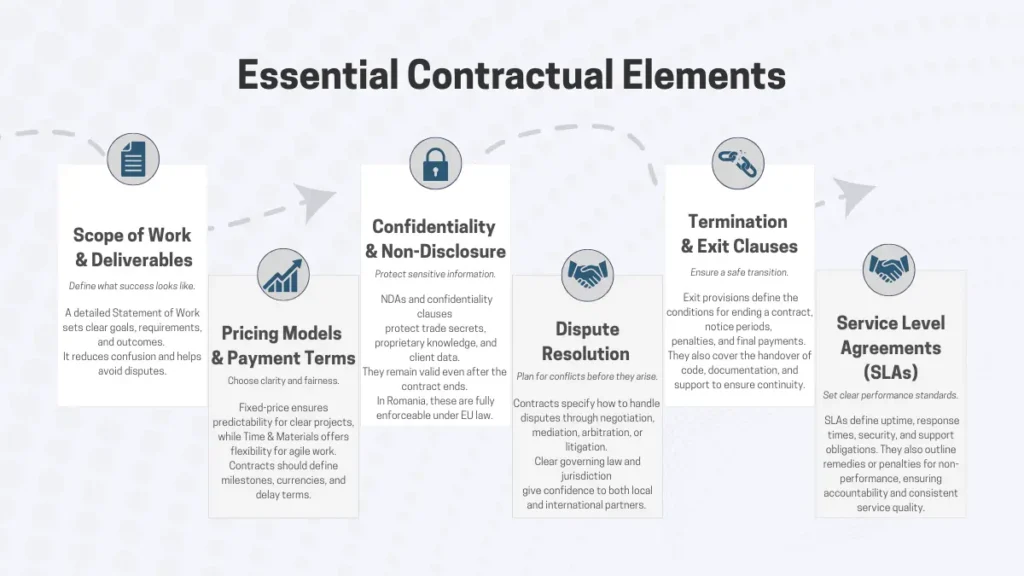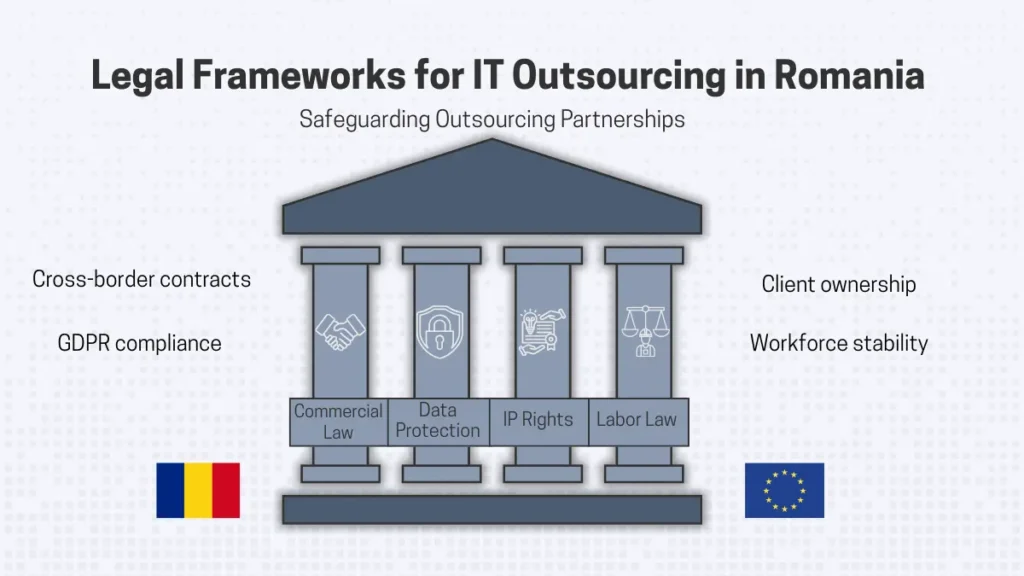Reading time: 12 minutes
In recent years, Romania has become one of the most appealing places for IT outsourcing in Europe. The country offers, among others, a skilled workforce, competitive costs, and a strong cultural fit with Western partners. This has attracted companies looking for reliable software development and IT services. While technical skills and delivery capabilities matter, there is an equally important factor that often gets overlooked: legal compliance.
For companies within the Western European region, especially those in the EU, outsourcing extends beyond the scope of just coding skills and project management. Data protection and intellectual property rights play a key role in each outsourcing agreement. The European regulatory structure, which in large part is guided by the GDPR, puts in place very particular requirements as to how personal data is to be treated, stored, and shared. Also of great importance are clear-cut terms in the contract that address issues of software ownership and promote transparency throughout the business partnership.
This article looks at what you should pay attention to when you outsource software development to Romania. We’ll look at the legal aspects of IT outsourcing to Romania: data protection, intellectual property, contract terms, and dispute resolution. These are the elements that will help you to make a safe and informed decision.
By understanding the legal framework, you can approach outsourcing in Romania confidently, knowing your business interests are protected at every step.
How Legal Aspects Matter in IT Outsourcing

When businesses consider outsourcing software development, they usually first think about technical skills and costs. The legal side of outsourcing is often put on secondary positions, which can create risks. Without the right agreements and compliance measures in place, the outsourcing partnerships might lead to disputes over intellectual property ownership, security breaches, or penalties for mishandling personal data.
For clients in Western Europe, particularly those governed by EU regulations, having a solid legal framework is essential for building trust. Data protection laws, especially the General Data Protection Regulation (GDPR), clearly outline the responsibilities of both the outsourcing company and the client. A Romanian IT outsourcing partner that understands and adheres to these regulations can help ensure that sensitive information remains secure throughout the project.
Another consideration is intellectual property (IP) rights. When outsourcing software development, clients need confidence that the code, designs, and solutions they invest in truly belong to them. Well-crafted contracts eliminate any ambiguity by clearly defining ownership, licensing, and usage rights.
Outsourcing partnerships also rely on long-term cooperation. Having clear contracts and confidentiality agreements with well-defined dispute resolution processes offers stability and predictability. This allows clients to concentrate on projects, knowing that their legal protections are robust.
In conclusion, legal issues shouldn’t be seen as obstacles, as they are safeguards. By addressing them early on, businesses can lay a solid foundation for successful collaboration. Romanian IT outsourcing companies like Ambo Software offer both technical expertise and legal compliance, ensuring that clients benefit from both innovation and peace of mind.
Legal Aspects of IT Outsourcing to Romania

Romanian Commercial Law
Romania’s position as an IT outsourcing destination is well-known, and its part as a member of the European Union is a reason for this. Romania has been a member of the EU since 2007, and its commercial, contractual, and data protection policies are in alignment with those of other European nations.
For businesses in Western Europe, this is advantageous compared to outsourcing to Asian countries, as Romania is a member of the EU. Romania provides a cross-border outsourcing framework for its clients, which is easy to navigate for both pre- and post-contract interactions. As a result, the clients are not burdened with unfamiliar systems. It is important to note that Romania has a well-developed legal and business framework. Dispute resolution, contract enforcement, and intellectual property protection are all aligned with the EU standards.
Romania’s commercial law provides a legal framework that facilitates the conclusion of cross-border contracts. It covers a wide area, and this is evidenced by the wide range of languages that contracts can be written in. Many outsourcing companies like Ambo Software consider the structure of contracts from the perspective of their foreign clients.
GDPR and Data Protection
Data security is one of the most important and sensitive parts of software outsourcing. Member states in the EU are required to follow the General Data Protection Regulation (GDPR), and for EU companies, compliance is a must. Romanian IT outsourcing companies need to comply with the same regulations as businesses in Germany or the Netherlands.
GDPR outlines strict limitations on collecting, processing, and storing personal data. This affects outsourcing in several ways, ranging from managing application end-user data to processing employee data in development work. Clients outsourcing work to Romania need to ensure their selected provider has the appropriate safeguards in place. This includes secure infrastructure, access control mechanisms, and data retention and deletion policies.
Shared responsibility is critical in this framework, too. Both the client and the outsourcing provider bear the risks associated with GDPR compliance. Contracts must stipulate clearly defined compliance boundaries around data with roles, responsibilities, and liability. A reliable partner will not only ensure internal GDPR compliance but will actively demonstrate compliance with supporting documentation and other compliance mechanisms.
Intellectual Property Rights (IP Rights)
A primary concern of clients outsourcing IT projects is the ownership of the resultant work. Designated Intellectual Property (IP) rights establish the legal authority in terms of the control of the design, source code, and documentation prepared during the collaboration.
Due to Romania being part of the European Union, it has to follow the directives set by the Union. This helps the country in having EU-wide acceptance of intellectual property in outsourcing contracts. As a rule, the individual who creates the software or code automatically has the copyright. Though these rights can be transferred to the client in the case of outsourcing contracts. This makes all deliverables the client’s exclusive property. For foreign clients, the rights transfer needs to be clearly stated in the contract to avoid confusion.
To protect intellectual property, non-disclosure agreements (NDAs) are essential. They protect business-sensitive information, technical know-how, and project information from being exposed during and after the collaboration. Effectively written NDAs protect the product and the development strategic knowledge shared during development.
For businesses in Western Europe, there is reassurance in knowing that Romanian IT outsourcing companies work within the EU’s clear legal framework, where IP rights are enforceable across member states.
Labor Law and Contractual Stability
Another important factor in IT outsourcing is the stability and predictability of the workforce. In Romania, labor law is governed by national legislation and the broader European Union framework.
For international clients, this provides an extra layer of reliability. Projects are less likely to face disruptions from legal disputes over employment. Outsourcing companies can keep skilled developers in stable conditions. Unlike some non-EU outsourcing locations where labor laws may be less clear, Romania offers predictability and meets European standards.
From a contractual perspective, Romanian IT outsourcing companies are used to working with foreign clients and creating agreements that fit international practices. Contracts can be written in English and adjusted to the client’s jurisdiction if needed, while still being enforceable under Romanian law.
From a legal point of view, it is safe to say that Romanian IT outsourcing firms are experienced with foreign clients and incorporating international business standards. Agreements are easily made in English and tailored to the client’s country of jurisdiction, and in Romanian legislation, they remain valid.
Essential Contractual Elements to Consider

Scope of Work & Deliverables
In Romania, as in the rest of the EU, outsourcing contracts usually start with a detailed statement of work. This document outlines the project’s goals along with its functional and technical requirements, schedule, and expected outcomes. In the case of software development, expected outcomes often include source code, documentation, prototypes, and user training.
Another equally important element is how to manage changes. Including procedures for scope alteration using formal requests, budget changes, or updated timelines helps avoid disputes while maintaining flexibility and a changeable structure without the loss of responsibility.
At Ambo Software, every agreement that we have is accompanied by a clearly defined SOW to ensure that ambiguity is eliminated and that we deliver what our clients actually expect.
Pricing Models & Payment Terms
Cost remains a primary driver for IT outsourcing; however, the structure of the pricing model can impact the collaboration. An opaque model can lead to partnership erosion, while a clear and transparent model allows the client’s budget to be preserved alongside fostering a foundation of trust, which can lead to a fruitful partnership.
In Romanian IT outsourcing contracts, two models are most common, as next:
Fixed Price Agreements: This model works best for projects with a clearly defined scope and scheduled timeline. The client pays a pre-agreed amount for the completed deliverables. This model is predictable especially in timelines but does not offer the flexibility to adapt to new changes.
Time and Materials (T&M): This model is ideal for project scopes that are subject to change or are based on agile methodologies. Payment is based on work hours and resources used.
These are the more commonly used systems. Some outsourcing companies also offer a mix of both models in order to provide a flexible system, but still maintain a base stability.
In addition to the pricing model, payment terms must also be defined carefully. Contracts typically outline milestones against deliverables, either on a monthly cadence or in set phases, with incremental payment schedules. Providing specifics on the invoice details, like currency or terms for payment delays, also minimizes ambiguity.
Confidentiality & Non-Disclosure
Sharing sensitive information while outsourcing IT services is the norm. Safeguarding this information is crucial in maintaining the balance of trust in the relationship. Confidentiality clauses, as well as non-disclosure agreements, are vital in outsourcing contracts.
In Romania, NDAs and confidentiality provisions are fully enforceable under national and EU law, providing international clients with a solid legal safeguard. Typically, confidentiality provisions extend beyond the life of the contract. Thus, even when a project has been executed, sensitive information such as trade secrets, proprietary information, and data about customers remains protected from competitors and third parties.
At Ambo Software, we prioritize confidentiality in every collaboration. We incorporate NDAs and strong confidentiality clauses into all agreements, providing clients with the assurance that their information will remain secure.
Dispute Resolution & Governing Law
Outsourcing projects, even when well-planned and communicated, may encounter conflicts. Changes in scope, delivery deadlines, and payment terms are all examples. These disputes are an inherent risk in international collaborations.
In Romania, outsourcing contracts tend to have specific clauses for dispute resolution. These clauses specify methods of resolution, whether direct negotiation, mediation, arbitration, or even litigation. Many international clients lean towards mediation or arbitration as the first options because those two are less time-consuming and costly compared to litigation. Also, arbitration clauses allow disputes to be settled in a neutral location, which can be comforting to foreign partners.
The selection of governing law also matters. There are outsourcing contracts that clearly state the jurisdiction of law that shall govern the conflict. In cases where a project is based in Romania, it is common to choose Romanian law, but contracts can also agree to follow the laws of another EU country if both parties consent.
Termination & Exit Clauses
Similar to other EU nations, in Romania outsourcing contracts generally include termination provisions that specify under what circumstances either party may terminate the contract. These may include the contracting party not delivering on the contract, not meeting deadlines, not meeting quality standards, or financial difficulties.
Exit clauses explain in further detail how to handle the events after contract termination. This includes the handover of source codes and documentation, and any unfinished work. This may also include aiding in the handover process, which may involve training new personnel or temporarily managing systems until the new provider takes over.
Termination provisions can also specify notice periods, penalties, and final payment terms. For clients, this adds predictability. For providers, it ensures fair pay for work already done.
Service Level Agreements (SLAs)
An outsourcing contract usually contains a Service Level Agreement (SLA), which is a critical component. SLAs define the provider’s performance obligations and the benchmarks. Without SLAs, expectations can be unclear.
In the case of IT outsourcing, SLAs cover a wide range of domains, from system uptime, response and turnaround times, security, and even support coverage. In development projects, SLAs can define the coding standards, the standards for technical documents, and the timelines for delivery.
The remedies and penalties associated with SLA breaches are equally critical. Contracts often stipulate compensatory, discount, or credit clauses for failing to deliver a specified performance threshold. This system promotes high-quality service.
Practical Tips for Clients Outsourcing to Romania
Simply following best practices enables businesses to mitigate risks and achieve smoother collaboration with Romanian IT outsourcing companies.
Conduct Thorough Due Diligence
With outsourcing, everything is seemingly seamless until problems arise. Confirm the outsourcing partner’s legal and financial standing, reputation, and request case studies or references before signing an agreement.
Ensure Clear and Bilingual Contracts
Contracts must be bilingual to the parties’ mutual understanding scope and clearly delineated. Romanian courts may require a translation for enforceability, so a copy in Romanian is a must.
Verify GDPR Compliance in Practice
Outsourcing comes with a host of risks, and one of the most critical is data outsourcing. Contracts and verbal assurances aren’t enough. Providers need to have written data security policies, access control, and GDPR compliance procedures. This helps to guarantee sensitive business data is actively protected.
Start with a Pilot Project
It is better to start with a smaller engagement than to commit to a larger one. With a pilot, clients can evaluate the communications, the delivery of the work, and the vendor’s compliance with legal and contractual obligations. Often, successful pilot programs make way for larger, scalable partnerships.
Involve Legal Counsel, but Trust Experienced Providers
Independent legal counsel can offer opinions on the more complicated parts of the work. However, having a provider with proven international experience eases the burden. For example, Ambo Software has incorporated legal and regulatory compliance with the EU and Romanian law into its contracts, thus making the client’s task easier.
How Ambo Software Ensures Legal Compliance
At Ambo Software, having decades of experience, we know that outsourcing is also about trust, transparency, and legal security.
From the very beginning, we issue straightforward agreements that capture scope, deliverables, IP transfer, and confidentiality. The clients retain complete rights to the software upon completion, which is assured contractually.
Another area we prioritize is protecting sensitive information. Operating within the EU, we are bound to the GDPR framework, which dictates strict data security protocols for all projects. These include data access, physical infrastructure, and data-handling procedures.
For us, stability and predictability are key to long-lasting partnerships. Our agreements contain reasonable termination clauses, exit strategies, and defined service benchmarks.
Ambo Software goes beyond offering outsourcing services. Through the amalgamation of legal frameworks, skilled IT expertise, and robust legal frameworks, we grant our clients assurance. Clients partnering with us are not only gaining skilled Romanian programmers, but are receiving a guarantee of compliance with legal and professional standards from the service provider.
*****
For firms throughout Europe and elsewhere, outsourcing software development to Romania provides an opportunity to gain specialized skills, save costs, and enjoy a beneficial match in culture. Still, the legal aspects of outsourcing to Romania is as vital as the technical side. A successful and secure partnership requires effective data protection, intellectual property rights, contracts, and dispute resolution.
Ultimately, the key to success is selecting the right partner. This partner should not only deliver high-quality software solutions but also respect and incorporate the legal protections clients need.


